

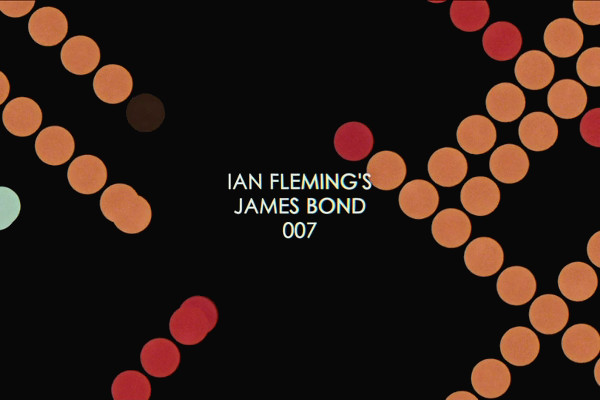
This year saw the release of the latest James Bond movie, No Time To Die, which can be ordered online via Amazon. In the meantime, please join me as I rank the James Bond movies, from worst to best...
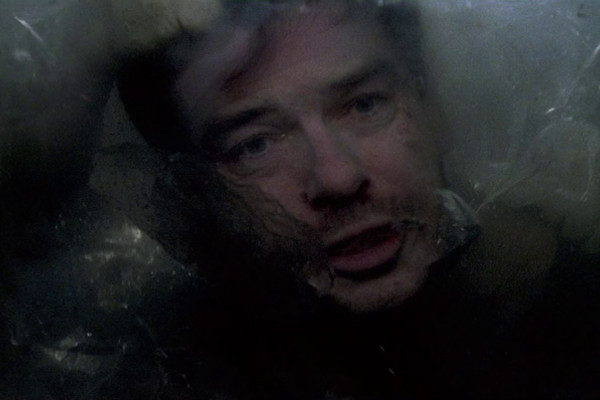
On any objective level, Die Another Die is very much the lowest point the series ever sank to, something universally agreed upon. The dialogue is appalling, the excessive CGI, stretching far beyond its capabilities, is risible. Even the silly "CGI bullet" during the opening titles is horrendous cheese, as is Bond cutting off his overgrown hair, or being smacked in the gut and told it's the "punchline".
Yet it's not as offensively bad as the two Brosnan entries that rank just above it. It's an unashamedly dumb picture, but one that doesn't insult the intelligence of the audience by having something as contrived as the plot being resolved by a computer hacker who just happens to have an OCD habit with clicking pens picking up an exploding biro. Granted, it insults the intelligence in lots more ways than that, but it revels in its stupidity, rather than expecting praise for it.
Yes, Die Another Day is a much-slated Bond film, ridiculed for silly gadgets and horrendous computer effects, as if such things aren't endemic of the entire Brosnan era. Where it must be given due credit - and also ultimately disappoints - is that, to start with, it dares to try something new. Whereas the rest of his run was very much in the same vein of traditional, by-the-numbers Bond, this one opens with him captured, tortured, disowned and believed to have defected. It's Bond gone rogue, where even the theme tune, long since generated by the computer programme Bassey-O-Matic, suddenly goes incredibly left-field.
Now, whether Madonna's experimental (if not quite avant garde) take on a Bond theme works for you or not, she, and the producers, must be credited for daring to try something a little different. Sadly, within half an hour it begins to resemble a typical Brosnan vehicle, and just over an hour in the entire status quo has been reset, like the opening needn't have even happened. It's a backwards step, the series threatening to go into a genuinely quite new territory, before losing nerve and backing out of the deal.
A failed experiment is sometimes more worthy than a succeeded attempt at mediocrity, and those opening 20 or so minutes are actually quite something. It's just a shame about the two hours that follows. Brosnan was dropped, making public statements that were inflammatory and, astonishingly in hindsight, the two writers (who had come on board with the previous entry) were retained for all five movies when the series was rebooted four years later.
Also of note is that the sex scenes are far more explicit in this Bond movie than any before it, Brosnan even showing us his cum face - which is a little different from the "choking" face he seems to do in every one of his Bond movies. Brosnan was a reasonable choice as Bond, but the characterisation was formulaic and uninspired. Crueller critics might suggest that the nearest Pierce Brosnan got to a display of real acting was that time he was sat in front of Bob Hoskins at the end of The Long Good Friday, but such a harsh criticism won't be written here.
With James Bond there is a subtext, intentional or otherwise, of Bond's enemies being "the other". Naturally, the basic premise of the series makes it difficult to have many English enemies, but there's a consistent undercurrent that not only are Bond's enemies foreign, occasionally gay, but frequently disabled. It's tropes from yesteryear unchecked, so that if you're foreign, bald, disfigured and maybe a little bit kinky, James Bond is there to eliminate you.
Not only is Bond there to safeguard a fictional England where the Empire may as well have never fallen, but he's there to take out anyone that doesn't meet basic standards of heterosexual masculinity, from a half Asian doctor with metal hands, all the way up to a Croatian with a slashed face and a bullet in his head that can't satisfy a woman sexually the way Bond can.
This unfortunate subtext of the Bond movies is met head-on here, where Bond causes diamonds to permanently scar a man's face - the guy's only foreign, so Bond, a modern day Clive of India, takes a shortcut to make him fit another of his checklist requirements. It's for these reasons that people who call for the character to become black are not only wide of the mark, but are also missing the core premise of the character, an amoral killer forged in the name of imperialistic dreams rather than an explicit "hero".
By racially recasting Bond, not only are you misunderstanding that he's not an indefatigably "good" person, but you're also removing the core spirit of his character, which isn't necessarily one you're supposed to support. And if Bond has his flaws removed to become more of a straightforward "Jason Bourne" figure, then what are we left with? And no, answering "Daniel Craig" is too obvious.
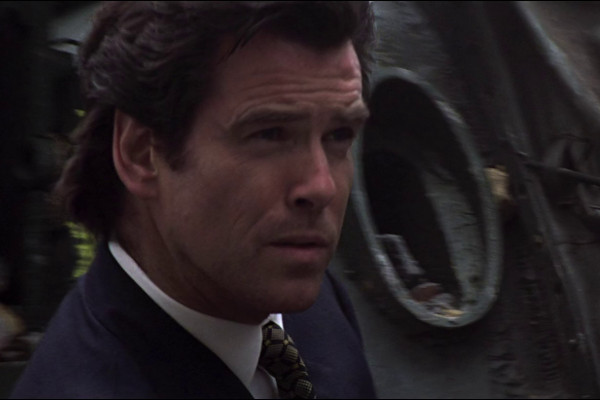
GoldenEye was seen as a return to form for many. Inflation adjusted, it was the sixth highest-grossing Bond film at the time of its release (Roger Moore's final entry and Timothy Dalton's two turns all made the bottom four) and even had a popular computer game to go with it a couple of years later. While Nintendo 64's "GoldenEye 007" wasn't the first computer game based on a James Bond film, it was one that broke through to a mainstream, reportedly selling over 8 million copies.
All of which isn't just incidental detail, but is actually completely germane to the point: no other James Bond film before (or, arguably, since) could have fitted so seamlessly into a first person shooter video game. The James Bond film series always had a tenuous respect for the intelligence of its audience, and, if not quite openly anti-intellectual, was fairly insulting to ticket buyers. But this one takes it all to ludicrous extremes, a spy movie for those who think James Bond is a man who drives a tank through civilian streets and fires a machine gun.
But Goldeneye, brought to life in the age of CGI (the opening title sequence now looks like something from a Geocities website, with fonts produced via Windows Movie Maker) this is a Bond that openly disrespects anyone who sits down to watch it. A Bond that possesses an open subtext that says "the audience are cretins". A pre-credit sequence where Bond leaps into an falling aeroplane and pulls back the throttle before it crashes is the kind of thing that Roger Moore's self-parodying Bond could have gotten away with, but the Brosnan films want to be serious and silly. "Having your cake", etc.
All of the actors to play Bond bring something different to the part, making it possible to appreciate them depending on what mood you're in. All, that is, except for Brosnan. There's nothing that Pierce Brosnan brings to the table that hasn't been seen before, and it's a shallow, "Bond-by-numbers" take on the character, reverting what threatened to become a three dimensional character back into a living cartoon. He certainly looks the part, but the wince-inducing Carry On dialogue begins to grate when this is an attempt at a "serious" film.
To go with this, the "Bond girls" begin to get sillier names again. While stuff like "Pussy Galore" was crass, the Brosnan equivalents have no real double meaning, just single entendres there purely to set up a gag. So it is that in a later Brosnan film Denise Richards is inexplicably called "Christmas", purely so Bond can joke about her cumming more than once a year, while here a villain is called "Onatopp" because - shock, horror! - she doesn't like the missionary position.
But the real issue with the Brosnan movies is that they attempt to reaffix the character within the modern day, disregarding the fact that he never existed within the real world in the first place. Bond is essentially a post-Imperial fantasy, a Boy's Own adventure where the UK never stopped being a major player on the world stage. The Bond world doesn't need to reconfirm its place within a post-Cold War climate when the majority of its operations within the Cold War saw it battling against completely fictitious organisations and power mad megalomaniacs. There's no need for way-too-familiar faces to buy a book on "The Dummy's Guide to a Cod Russian Accent" when the entire basis of the film series is fantasy island.
Similarly, the horribly-written attempts to contemporise Bond's sexism - with lines that sound like a writer's words rather than something an actual human being would ever say - miss the point that Bond hasn't suddenly got behind the times, he was always an old-fashioned, out-of-date character. Yet such things also raise questions about the fundamental nature of 007. If you're making James Bond movies and feel that he can no longer exist within the current time without being changed, then is it time to stop making James Bond films? How far can the character be removed from the core of his being - whether that core seems acceptable or not - before it's no longer the same character?
Perhaps the sole good thing about the movie is Judy Dench entering as a new M, the head of operations. Robert Brown had covered the role in four films following Bernard Lee's death, but always felt too much of the same "type", very much just a fill in. Sadly, Dench only works when Daniel Craig comes aboard, as she's saddled here with horrifically bad, exposition/motivation packed dialogue that sounds like a first draft.
She's not alone, as various other characters, particularly Sean Bean, stand around delivering reams of backstory to one another, and in so doing sacrificing any attempt to sound like real people talking. There's even an excruciating scene where M, Bond and another operative all stand around discussing at length what an "EMP" is, despite the fact that all three of them already know. The emergence of "Basil Exposition" in the Austin Powers series was one of its better jokes, but it's hard to parody Bond when it's already making itself beneath contempt.
If there's one thing going for Goldeneye, it's that it's watchable. As we've now reached the mid-'90s, the somewhat languid pace of earlier Bond films has gone, but all that's left is flash and spectacle with no real substance. Astonishingly, it's regarded as the best Brosnan film, despite actively insulting its audience for over two hours. Vapid, brainless and soulless, this risible dirge predictably succeeded at the box office.
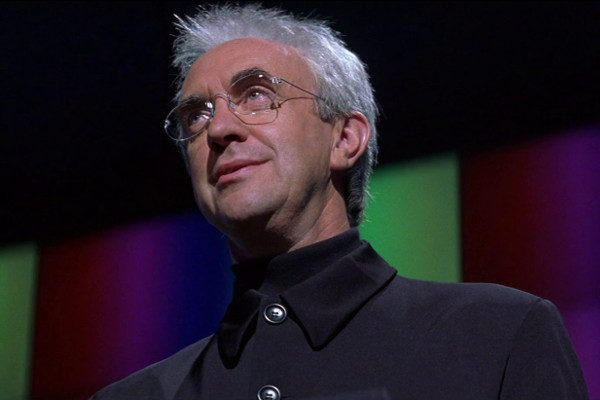
By the time Brosnan joined, nearly all the original Ian Fleming story titles had been used. There was Casino Royale, which had already been given to a ropey 1967 spoof. There were also some short stories by Fleming with titles that hadn't been used, but no one was ever likely to call a James Bond film "Risico", "The Hildebrand Rarity", or "Quantum of Solace". (Wait, what?)
So it is that, from Licence To Kill onwards, the series began making up its own titles, often quite badly. For many of them, it seems as if the producers just used a random title generator, usually with the word "die" in it, 2021's entry included. While abstract titles can reward, the inexplicable "Tomorrow Never Dies" doesn't really hang together.
The first Bond movie since the Connery era to be (just) under two hours long, Tomorrow Never Dies does at least have the decency to be over quickly. Written by one of the two men behind Goldeneye, this seems to make it only half as idiotic, and moderately less patronising to its audience. Just about. Reputedly the first film ever to be entirely financed by product placement, it is like watching a car commercial for two hours, with a few watches thrown in for good measure.
Said to have been so rushed in production that filming started before the script was even finished, crueller critics might also suggest that filming ended before it was finished, too. The concept of a media mogul who uses misinformation to control the world has potential, but is drawn so broadly it never takes as something tangible or real, even within the world of James Bond. Bond movies were rarely creditable for their strong dialogue or richly-drawn characterisation, but here any moments of dialogue are just breaks in between action sequences.
It has to be remembered that 007's job is that of a spy, but within 20 seconds of first speaking to the media owner Elliot Carver (Jonathan Pryce) he lets him know that he's onto him. Rather than an intelligent investigator infiltrating an organisation, he instead initiates a series of constant attempts on his life that involve wilful destruction to property and lack of care for civilians, even from Bond himself.
Bond's ability to outrun machine gun fire had already taken an upgrade during Licence To Kill, but the Brosnan Bond avoids so many bullets with superhuman ease he could be a character in a Marvel movie. Gone is the gentleman spy with his Walther PPK (although the latest model does get a plug) and instead Bond picks up machine guns of his own in the Brosnan era.
Jonathan Pryce is a fine actor, but perhaps lacks the physical presence to really impose himself, and can't make his role believable. Partly it's due to the extremely flimsy motivation of such a villain - and this is a film series that once had a man who was motivated by his love of fish - and partly it's down to the satire. The Brosnan films assume their audience are idiots, and so hammer the point over and over. Yet original choice Anthony Hopkins would at least have added some physicality to the under/overwritten part.
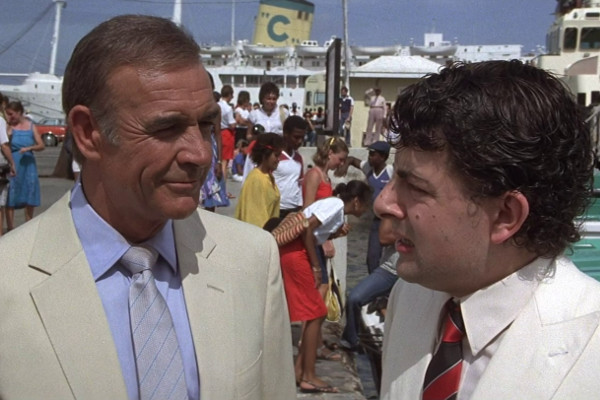
It must have been difficult being Kevin McClory. McClory was an Irish writer who worked with Ian Fleming and Jack Whittingham on a film treatment for the James Bond character created in Fleming's novels. Ultimately their treatment - for an original story, Thunderball - didn't get made first, but well-known legal issues ensued after Fleming published Thunderball as the next James Bond novel, based on the film script, rather than the other way round.
It's not fully known "who wrote what", as both sides have contested elements of the work, and other names are involved, along with odd offshoots like attempts by McClory to make a James Bond cartoon. It's complicated, basically. But the resulting legal complications eventually left McClory with the legal right to make his own James Bond films based on the novel of Thunderball. While the movie Thunderball was incredibly lucrative, it was also incredibly tedious, so such a result is akin to being told you've got the rights to make your own episodes of Scooby Doo, providing they only feature Freddie and the Mystery Van.
So, here we are. A pocket parallel universe where Connery's Bond never retired, just got old, and gets put back into action in a retread of Bond's dullest tale. It doesn't quite make any logical sense, as Bond meets characters with the same names, without ever once questioning whether he's got deja vu. Connery's Bond fits awkwardly into the '80s, a film made with jarring music and not a bra in sight. There's an unwritten rule, broken here, that no James Bond film should ever feature someone with a mullet playing an arcade machine, though the big centrepiece is Bond playing an computer game with Largo. Another issue, perhaps a minor one, is that when Connery played Bond in the '60s he was attempting an English accent, as hard as it may be to believe. Here such attempts seem to have gone completely out of the window.
But probably the worst part of the film is a misjudged idea to have Rowan Atkinson as a "comedy" aide with a speech impediment. No one should find James Bond movies particularly amusing, as the core "humour" in them is essentially second-rate Carry On (which themselves could be pretty second-rate on many occasions) but the overt, contrived attempts at light relief in Never Say Never Again are particularly galling. Rowan's "Nigel Small-Fawcett" is an unbelievable, one-dimensional creation, like having Mr. Bean in a serious Bond movie.
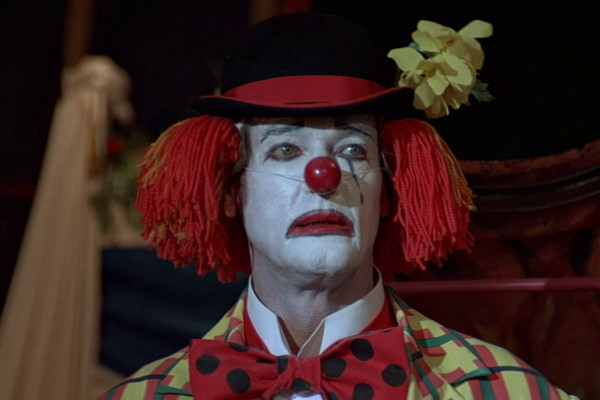
Comparing James Bond films is difficult, bordering on impossible, because it takes "apples and oranges" to the next degree. You've got instalments that are unintentionally camp, ones that are played straight, and most of the Moore ones are self-reflexive. They not only work in different forms and genres, but different levels.
Yet there's also the concept of having to put aside subjective judgements in favour of objective ones. While all criticism is subjective, there are areas where you can be wholly aware of the inherent quality of something, and judge it accordingly, even if it goes against your own personal tastes. For example, I'd possibly rather listen to "Chirpy Chirpy Cheep Cheep" than watch a ballet - though I don't mind ballet - but wouldn't argue that the '70's cheesy pop track is of greater artistic merit.
With that, we come to Octopussy. A film I've always had a major soft spot for, even if it has to be conceded that, even for the Moore era, it's all got a little bit too silly. It's also more than a little crass, even by Bond standards, with the opening credits tacky and even the title of the film itself a step too far. When you've got a film title that makes "Pussy Galore" look subtle, you know it's crossed a line. (A note of trivia is that, for a sex-driven series that presents chaste depictions of passion, then this is the first entry to show one of Bond's lovers using her tongue while kissing.)
So rating this against, say, Thunderball is hard. Thunderball is, in its way, by far the superior film, but is also lethargic, whereas Octopussy, as silly as it is, moves along, and is, if you're in the mood for it, diverting. Yet while Roger Moore dressing up as a crocodile or doing a Barbara Woodhouse impression to a tiger can be funny, it really does feel like this is the end of the line for the film series, a run that's become stale and lost in jokes that no longer offer meta critique, but instead just appeal to the lowest common denominator. Ultimately, seeing James Bond kicking people in the balls is a low point for the character, even if he is wearing clown shoes while he does it.